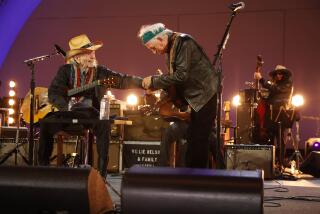POP REVIEW : BLUEGRASS LEGENDS PLAY ON TRADITION
- Share via
The prospect of seeing several bluegrass music giants on the same stage Sunday raised the kind of question baseball’s tantalizing but frequently frustrating All-Star Game does: Would these individual talents blend like a team that plays together every day?
Fortunately, the four-hour “Legends of Bluegrass” show at the Pacific Amphitheatre minimized that problem by limiting the obligatory all-star “jam session” to about 20 minutes at the end.
At that point, following his own spirited set, headliner Bill Monroe invited supporting acts Ralph Stanley, Mac Wiseman, Jim & Jesse and their bands to join him for several gospel numbers. But the presence of six guitarists, three banjo players, three fiddlers, two mandolinists and assorted others was tantamount to overkill, since bluegrass derives its character from the uncluttered interplay among a few instrumentalists.
Before that moment for the masses--or in this case, for a sparse but enthusiastic crowd--tradition was respected in individual sets by these four bluegrass standard bearers, each a veteran of at least 40 years.
Ironically, because Monroe is a certified legend even outside bluegrass circles, his set felt the most restricted by the greatest-hits syndrome. Monroe must have played his signature songs like “Uncle Pen,” “Blue Moon of Kentucky” and “In the Pines” hundreds of times by now, which makes spontaneity and freshness well nigh impossible.
Certainly his current batch of Bluegrass Boys are to a man accomplished musicians, and their 75-year-old leader remains a spry mandolinist and a plaintive vocalist, although he occasionally strained to hit some notes. He also proved to be an exuberant dancer, turning in some energetic steps with a young woman plucked from the audience.
But by sticking largely to his best-known songs, Monroe left most of the musical surprises and inventiveness to the Virginia duo Jim & Jesse McReynolds and veteran balladeer Mac Wiseman.
During their briskly paced opening set, Jim & Jesse moved from the predictable (Jimmie Rodgers’ “Blue Ridge Mountain Blues”) to the startlingly hip (Randy Newman’s “Rider in the Rain”), gracing each song with effortless harmonies that helped pave the way for the Everly Brothers.
Wiseman used his stunningly agile phrasing and soaring tenor to turn a hokey tear-jerker like “The Letter Edged in Black” into high drama and elsewhere reaffirmed the power of linear storytelling so rare in pop music in recent years.
While Stanley injected plenty of energy and humor into his banjo playing and into a cappella harmonizing with his cohorts, the sheer length of the evening began to take its toll during his set, which preceded Monroe’s concluding performance.
Despite the estimable standings of all concerned, the show would have benefited had it been about an hour shorter.
FO From left are Jesse McReynolds, Bill Monroe and Jim McReynolds at Pacific Amphitheatre.
More to Read
The biggest entertainment stories
Get our big stories about Hollywood, film, television, music, arts, culture and more right in your inbox as soon as they publish.
You may occasionally receive promotional content from the Los Angeles Times.










